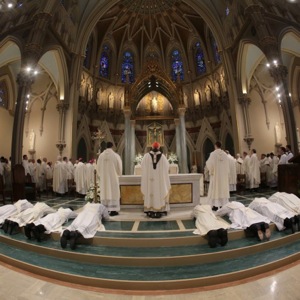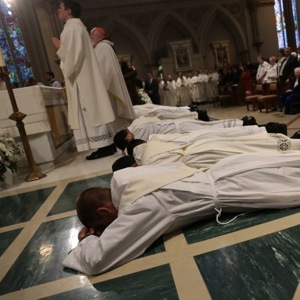
 ARDINAL SEÁN P. O’Malley, OFM, Cap. recently ordained eight men to the Priesthood on Saturday, May 20, 2017, at Immaculate Conception Church in Lowell, Massachusetts. (The Cathedral of the Holy Cross in Boston is currently under renovation.)
ARDINAL SEÁN P. O’Malley, OFM, Cap. recently ordained eight men to the Priesthood on Saturday, May 20, 2017, at Immaculate Conception Church in Lowell, Massachusetts. (The Cathedral of the Holy Cross in Boston is currently under renovation.)
Please pray for these new priests! Fr. Jason Rinaldo Giombetti, Fr. Pablo Gomis, Fr. Kevin Paul Leaver, Fr. Godfrey Musabe, Fr. Wellington Oliveira, Fr. Joel Americo Santos, Fr. William Paro Joseph Sexton, and Fr. Michael Louis Zimmerman
 FFORDED THE OPPORTUNITY to direct the music for this ordination, I hoped to emphasize to the choir the following:
FFORDED THE OPPORTUNITY to direct the music for this ordination, I hoped to emphasize to the choir the following:
What we do is not simply “important” music for an “important” Mass. This is a day that these eight men will carry in their hearts for the rest of their lives. Not only what we sing, but how we sing will have spiritual impact beyond a nice memory. It will help shape their formation.
Music itself won’t solve any problems or persuade any newly ordained priest to adjust their liturgical inclinations. That’s not the point.
But music sung in prayer and with joy hopefully permeates their hearts and minds. It can reach the hearts of their family and friends who will support and accompany them throughout their lives. To sing in prayer and with joy is pastorally imperative for they are all we have.


 ERHAPS OF INTEREST, you can watch a video of the Ordination in the Archdiocese of Boston here. We are deeply grateful to Evan Landry for this recording.
ERHAPS OF INTEREST, you can watch a video of the Ordination in the Archdiocese of Boston here. We are deeply grateful to Evan Landry for this recording.
Recording for broadcast is always tricky, especially capturing the true blend of a choir in the room. Mr. Landry did an exceptional job (with omnidirectional microphones) capturing a fairly representative blend of the choir while contending with specific restrictions in space.
Music of note:
• 4:15 • INTROIT • Sacerdotes Dei, benedicite, Mode VI • (Marc Demille intones verses) I chose to have men and women sing in unison for a brighter sound, to create a more energetic pronouncement. This was followed by the hymn This Is the Feast of Victory by Hillert.
• 20:45 • Kyrie and Gloria from the Mass of the Angels (Allesandra Cionco-Dahlberg, soprano)
• 28:30 • Psalm 23 • Jeffrey Ostrowski (Jaime Korkos, psalmist)
• 34:15 • Gospel Procession, Alleluia, Theodore Marier
• 36:24 • The Gospel is beautifully chanted by Rev. Mr. Joseph J. Sanderson
• 1:07:56 • Litany of the Saints (Marc DeMille Cantor)
• 1:16:30 • Holy Spirit, Come and Shine Chant, arr. Leo Abbott (Tom Manguem, cantor) and improvisation • repeated at 1:27:25
• 1:44:00 • Christ the Lord, a Priest Forever, RJC, Ps. 100
• 1:52:00 • You are My Friends, RJC • Jn. 15:14, Ps. 100
• 2:27: 40 • Agnus Dei XVI, Byrd/Agnus Dei XVIII
• 2:30:13 • Sicut Cervus Palestrina
• 2:33:28 • Adordo Te devote
• 2:53:45 • THAXTED, O God Beyond All Praising, arr. Richard Proulx
• 2:59:45 • Processional, Mathias • Dr. Janet Hunt, FAGO, organ

Photos by George Martell • Archdiocese of Boston
